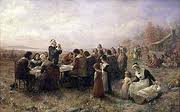
The event that so many of us call the “First Thanksgiving” was celebrated by the Pilgrims after their first harvest in the New World in 1621. The first Thanksgiving feast lasted three days, and was attended by 53 Pilgrims and 90 Native Americans. The New England colonists were accustomed to regularly celebrating “thanksgivings,” or days of prayer. (They also celebrated “fast days” to seek God for forgiveness and renewal.) These days of prayer were designed to thank God for blessings such as military victory or the end of a drought. Contrary to the many popular opinions that we hear annually most historians believe the 1621 events were not a specifically religious observation.
Today millions of us will gather with our family and friends to celebrate the abundance of our blessings, both material and spiritual. As Christians we know these blessings are ours because of God’s kindness, not because we have been good or gracious and thus deserved them. The blessings are ours because of God’s grace! But we also remember on this day that these joys are possible because of the sacrifice of others who came before us.
Rev. Carlos L. Malave, the executive director of Christian Churches Together (US), recently noted in a Thanksgiving email that when you look back over the history of America “the cost of our privileges has been more than the sacrifice of previous generations. The history of how we arrived at this point and place is tied to the suffering and literal sacrifice of millions of human beings.”
As many of you know the Catholic Church celebrates the lives of great saints. One such saint was Bartolome de las Casas, a Dominican friar who was one of the first Europeans to arrive on “the new continent.” Soon after De las Casas arrived in America he was horrified by the cruelty he saw exerted against the local inhabitants. Though many saw these settlements in the new world as driven by “evangelical motivations” De las Casa summarized his view by writing:
In order to gild a very cruel and harsh tyranny that destroys so many villages and, solely for the sake of satisfying the greed of men and giving them gold, the latter, who themselves do not know the faith, use the pretext of teaching it to others and thereby deliver up the innocent in order to extract from their blood the wealth which these men regard as their god.
Thanksgiving should be more than a celebration of our prosperity and the good (American) life. We should ponder our blessings, for sure, but we should also consider the impact our way of life has had on others throughout our blessed, and troubling, history. We are blessed, this I will not deny. But that blessing has come with a price. We have very often used and abused others to get where we are as a nation. We ought to be thankful but we ought to cultivate a profound measure of humility about how we have failed even our own ideals. This humble spirit will lend itself to a true day of Thanksgiving, not just a day about our personal health and material stuff. We should remember the great mercies of God shown to an undeserving people but we should also remember that some of our earliest founders were anything but pure in their motivations to settle, and then conquer, this new world.
Related Posts
Comments
My Latest Book!

Use Promo code UNITY for 40% discount!


